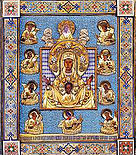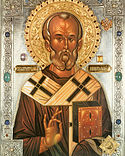Pre-Council Committee Rules for the 6th All Diaspora Council
6th All-Diaspora Council Delegate Rules
-
Delegates to the 6th All-Diaspora Council will be individuals in canonical obedience to the Russian Orthodox Church Abroad who recognize the All-Diaspora Council as the highest church authority abroad and who will comply with its decisions.
-
Individuals belonging to churches in Eucharistic communion with the ROCA may attend the Council as observers by invitation of the Pre-Council Committee.
-
Individuals from other church jurisdictions may be granted equal standing as delegates from the Russian Orthodox Church Abroad, on the condition that they recognize the Council as the highest church authority abroad and comply with its decisions.
If these individuals are not prepared to recognize the Council as the highest church authority, they may attend the Council as observers, without the right to vote and with written permission from the Pre-Council Committee.
-
The Council will consist of bishops, clergy and laypeople with the number of laypeople and clergy approximately equal.
-
Individuals are selected as delegates to the Council by virtue of a) their office, b) by nomination or, c) by election.
-
Delegates to the Council by virtue of their office are: a. Bishops of the Russian Orthodox Church Abroad
b. Clergy of the Russian Orthodox Church Abroad
c. Delegates of past All-Diaspora Councils, who have remained loyal sons and daughters of the Russian Orthodox Church Abroad (with written approval from their ruling bishop)
d. Members of the Pre-Council Committee
Note: Met. Agafangel, Abp. Georgiy, B. Kirill, B. Afanasiy, B. Nikon and B. Anfim, who were present at the Extraordinary Council of Bishops session in July, 2016, are summoned to the Council in their capacity as the accused.
-
A ruling bishop has the right to nominate a number of individuals as delegates. The specific number will be reviewed by the Pre-Council Committee.
-
Male and female monasteries may send two delegates to the Council (in addition to monastics in priestly orders).
-
Charitable organizations: the Blessed St. Xenia Fund, the ROCA Fund for Assistance, the Sts. Cyril and Methodius Fund and the Haiti Mission, may send one delegate each to the Council.
-
Every delegate of the All-Diaspora Council has one vote.
-
Dioceses and parishes, which for whatever reason are unable to send the delegates, may submit a confidential statement expressing their wishes or decisions.
-
Parishes numbering about 20 members may elect one (1) lay delegate. Parishes numbering about 40 members may elect two (2) lay delegates. Parishes numbering about 60 members may elect three (3) lay delegates.
-
Diocesan bishops have the right to approve elected delegates to the Council. A diocesan bishop may change elected delegates, in whole part or in part, if he determines that the rules for their election were violated, or if the qualifications of an elected delegate necessary for participation in the Church Council have not been met.
-
Local church groups will provide the funding for a delegate to attend the Council.

